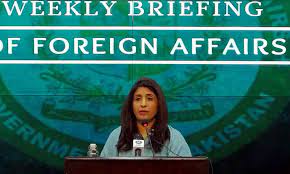FO objects to UK minister’s ‘xenophobic’ remarks

Islamabad: The Foreign Office spokesperson Mumtaz Zahra Baloch on Wednesday objected to the “discriminatory and xenophobic” comments made by British Home Secretary Suella Braverman on Pakistani men, saying it presented a “misleading picture”.
Braverman claimed that British-Pakistani men “hold cultural values at odds with British values.” She made the comments during an interview about strategies to combat child sexual assault.
Reacting to the statement in a presser on Wednesday, Mumtaz Zahra Baloch said the remarks painted a highly misleading picture signalling the intent to target and treat British Pakistanis differently, adding that the UK home secretary had “erroneously branded criminal behaviour of some individuals as a representation of the entire community.”
In the interview, Suella Braverman commented about “the predominance of British-Pakistani males who hold cultural values totally at odds with British values.”
“[British-Pakistani men] see women in a demeaned, illegitimate way, and pursue an outdated and frankly heinous approach to the way we behave,” she remarked after learning that a Home Office report in 2020 found that the majority of child sexual abuse gangs are made up of white men under the age of 30.
The reports also underscored that there was not enough evidence to suggest members of grooming gangs were disproportionately more likely to be Asian or black.
In response, Braverman quoted reports from Rotherham, which was rocked by a child sexual exploitation scandal in which five British-Pakistani men were convicted of grooming, raping and exploiting young girls.
She cited another report from 2015 penned by Dame Louise Casey CB, which ironically noted how the British-Pakistani community had been “harmed by association” in the scandal.
The FO spokesperson criticised Braverman for failing to take note of the systemic racism and ghettoisation of communities.
“The home secretary omits to recognise the tremendous cultural, economic and political contributions that British Pakistanis continue to make in British society,” added Baloch.





